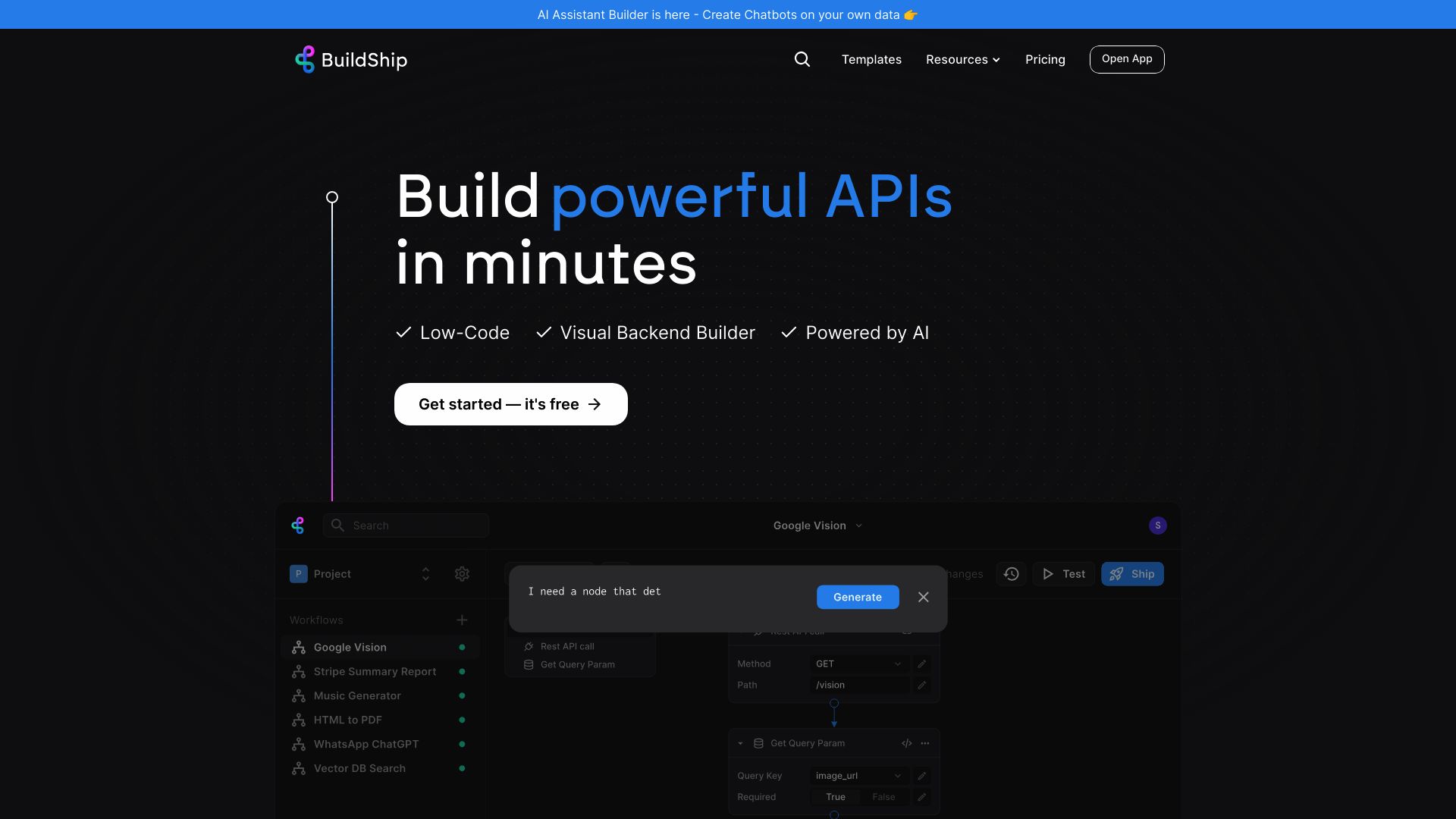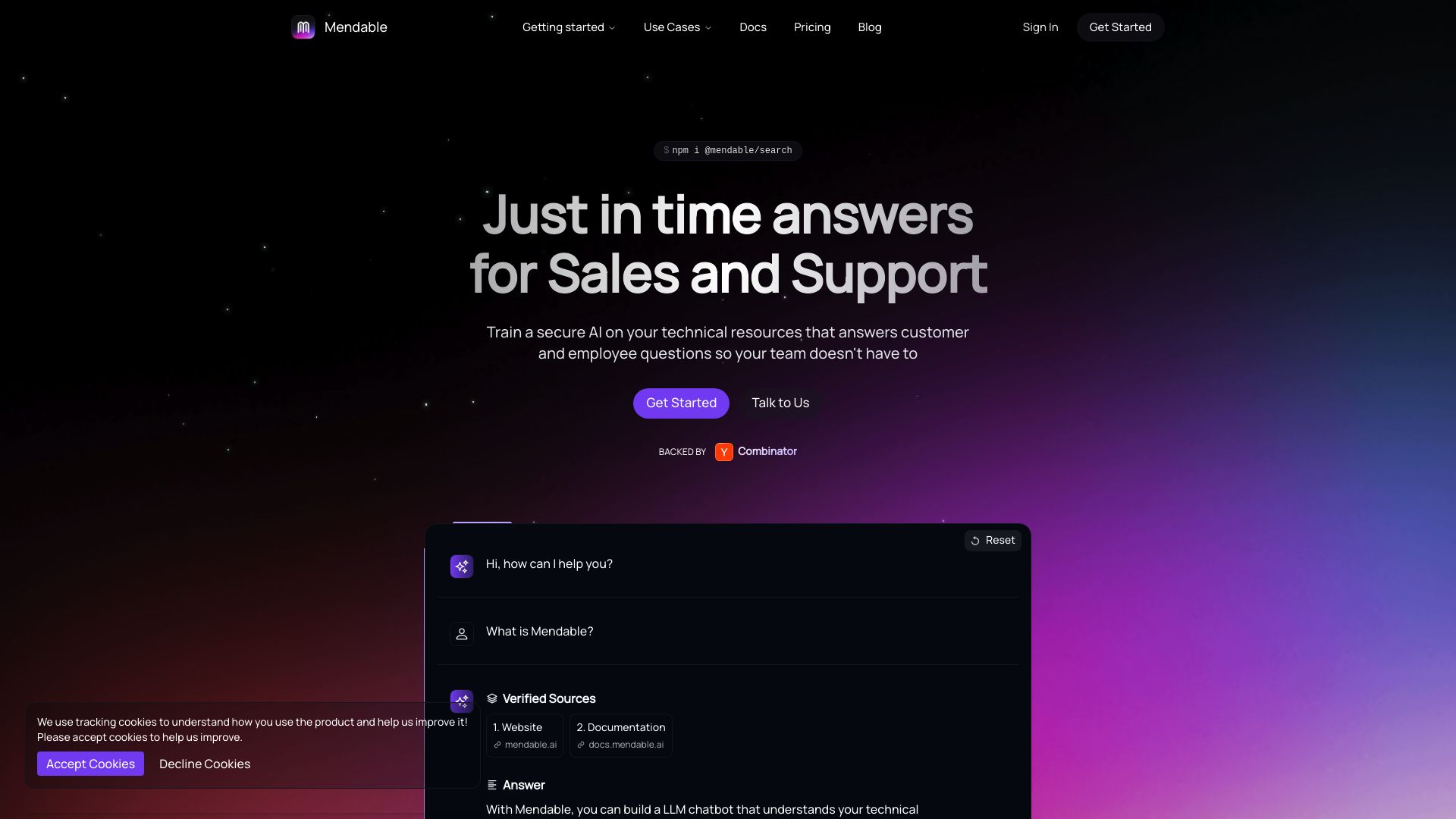BuildShip vs. Mendable: Comparing AI Development Platforms
AI development platforms revolutionize how businesses create intelligent applications, automate workflows, and enhance customer experiences. BuildShip vs. Mendable, and SmythOS each offer unique approaches to harnessing AI’s power. This comparison examines their core features, strengths, and limitations to help you choose the right solution for your needs.
We’ll explore BuildShip’s visual workflow builder, Mendable’s chat-powered search components, and SmythOS’s comprehensive AI development ecosystem. By the end, you’ll understand how each platform tackles AI integration, scalability, and deployment, enabling you to make an informed decision for your next AI project.
BuildShip Overview
BuildShip empowers developers and businesses to create scalable backend workflows and APIs without extensive coding. The platform’s visual no-code interface simplifies the process of building complex backend systems, integrating various data sources and AI models.


BuildShip’s drag-and-drop workflow builder features prebuilt nodes and AI-generated custom nodes, allowing users to craft sophisticated backend logic visually. The platform supports integration with popular AI models like ChatGPT and Stable Diffusion, enabling the creation of AI-powered workflows. For those requiring more control, BuildShip allows custom JavaScript/TypeScript code within nodes, bridging the gap between no-code and traditional development.
BuildShip’s drag-and-drop workflow builder features prebuilt nodes and AI-generated custom nodes, allowing users to craft sophisticated backend logic visually.
The platform shines in its deployment capabilities. Users can test individual nodes and entire workflows before deploying them as production-grade APIs. This seamless transition from development to production streamlines the backend development process. BuildShip also supports scheduled tasks and CRON jobs, enabling automated workflow execution without manual intervention.
Security remains a priority for BuildShip. The platform leverages Google Cloud Secret Manager to securely store API keys and sensitive information. OAuth-based nodes facilitate secure integrations with various services, ensuring data protection throughout the workflow.
While BuildShip offers a powerful set of features, it may have limitations in certain areas. The platform doesn’t explicitly mention features for maintaining memory and context across different sessions, which could be crucial for some AI applications. Additionally, the absence of specific features for classifiers, data lakes, and advanced analytics tools might limit its applicability in data-intensive scenarios.
Mendable Overview
Mendable provides chat-powered search components that deliver accurate, contextually relevant answers to customer questions based on existing documentation. These components integrate seamlessly into applications through Mendable’s API or pre-built modules for platforms like React and Docusaurus.


Mendable offers a range of customizable components including search bars, floating buttons, and chat bubbles. Users can tailor AI responses through customizable prompts, enhancing relevance and clarity. The platform supports auto-syncing of data sources from websites, GitHub, Notion, and Zendesk, ensuring information stays current.
Mendable provides chat-powered search components that deliver accurate, contextually relevant answers to customer questions based on existing documentation.
Key features include metadata filtering for precise control over information sources, robust APIs and SDKs for advanced integration, and Product Copilots that provide context-aware answers within applications. Mendable components integrate with popular platforms like Slack, Discord, and WordPress, expanding their versatility.
While Mendable excels in search and information retrieval, it lacks some advanced AI agent features. The platform doesn’t offer autonomous agents, multi-agent collaboration, or advanced problem-solving capabilities. Additionally, Mendable’s focus on search and retrieval means it may not be suitable for users seeking more complex AI agent development tools.
Mendable’s vision centers on streamlining information delivery through AI-powered search. By seamlessly integrating these capabilities into various platforms, Mendable aims to enhance user support and engagement with personalized, context-aware responses. This approach positions Mendable as a valuable tool for businesses looking to improve their documentation search and customer support systems, rather than as a comprehensive AI agent development platform.
Feature Comparison
BuildShip and Mendable offer distinct approaches to AI-powered development, with significant feature gaps between them. BuildShip provides a comprehensive backend workflow builder, while Mendable specializes in chat-powered search components.
BuildShip excels in workflow automation and API creation. Its visual builder and AI-generated custom nodes allow developers to craft complex backend logic without extensive coding. The platform integrates various AI models and supports custom JavaScript/TypeScript code, bridging the gap between no-code and traditional development. However, BuildShip lacks specific features for maintaining memory and context across sessions, which could limit its applicability in certain AI scenarios.
Mendable, on the other hand, focuses on enhancing search and information retrieval within existing documentation. While it offers powerful chat components and custom AI responses, it doesn’t provide the same level of backend workflow automation as BuildShip. Mendable’s strength lies in its ability to integrate with various data sources and platforms, but it lacks features for autonomous agents, multi-agent collaboration, and advanced problem-solving capabilities found in more comprehensive AI development platforms.
In terms of security, both platforms offer some level of data protection. BuildShip uses Google Cloud Secret Manager for securing API keys, while Mendable provides customizable AI responses. However, neither platform explicitly mentions advanced security features like IP control or constrained AI alignment, which are crucial for enterprise-level deployments.
Feature Comparison Table
| BuildShip | Mendable | SmythOS | |
|---|---|---|---|
| CORE FEATURES | |||
| Hosted Agents (Dev, Production) | ✅ | ❌ | ✅ |
| Environments (Dev, Production) | ✅ | ❌ | ✅ |
| Visual Builder | ✅ | ❌ | ✅ |
| No-Code Options | ✅ | ❌ | ✅ |
| Memory & Context | ❌ | ✅ | ✅ |
| Autonomous Agents | ❌ | ❌ | ✅ |
| Explainability & Transparency | ❌ | ✅ | ✅ |
| Debug Tools | ✅ | ❌ | ✅ |
| Multimodal | ❌ | ❌ | ✅ |
| Problem-Solving Capabilities | ❌ | ✅ | ✅ |
| Multi-Agent Collaboration | ❌ | ❌ | ✅ |
| Human-AI Interaction | ❌ | ✅ | ✅ |
| Audit Logs for Analytics | ❌ | ✅ | ✅ |
| Work as Team | ❌ | ❌ | ✅ |
| Agent Work Scheduler | ✅ | ❌ | ✅ |
| SECURITY | |||
| Constrained Alignment | ❌ | ❌ | ✅ |
| IP Control | ✅ | ❌ | ✅ |
| COMPONENTS | |||
| Foundation AIs | ❌ | ❌ | ✅ |
| Huggingface AIs | ❌ | ❌ | ✅ |
| Zapier APIs | ❌ | ❌ | ✅ |
| Classifiers | ❌ | ❌ | ✅ |
| Logic | ✅ | ❌ | ✅ |
| Data Lakes | ❌ | ❌ | ✅ |
| DEPLOYMENT OPTIONS (EMBODIMENTS) | |||
| Deploy as Webhook | ✅ | ❌ | ✅ |
| Staging Domains | ❌ | ❌ | ✅ |
| Production Domains | ❌ | ❌ | ✅ |
| Deploy as Site Chat | ❌ | ✅ | ✅ |
| Deploy as Scheduled Agent | ✅ | ❌ | ✅ |
| Deploy as GPT | ❌ | ❌ | ✅ |
| DATA LAKE SUPPORT | |||
| Hosted Vector Database | ❌ | ❌ | ✅ |
| Sitemap Crawler | ❌ | ❌ | ✅ |
| YouTube Transcript Crawler | ❌ | ❌ | ✅ |
| URL Crawler | ❌ | ❌ | ✅ |
| PDF Support | ❌ | ✅ | ✅ |
| Word File Support | ❌ | ✅ | ✅ |
| TXT File Support | ❌ | ✅ | ✅ |
Best Alternative to BuildShip and Mendable
SmythOS stands out as the superior alternative to BuildShip and Mendable for AI agent development and deployment. Our platform offers a comprehensive solution that addresses the limitations of both competitors while providing unmatched versatility and ease of use.
Unlike BuildShip’s narrow focus on backend workflows and Mendable’s specialization in chat-powered search, SmythOS delivers a complete ecosystem for creating and managing AI agents across diverse use cases. We empower users to build sophisticated AI solutions without extensive coding knowledge through our intuitive drag-and-drop interface and visual builder.
SmythOS delivers a complete ecosystem for creating and managing AI agents across diverse use cases… without extensive coding knowledge through our intuitive drag-and-drop interface and visual builder.
SmythOS excels in areas where BuildShip and Mendable fall short. While BuildShip lacks features for maintaining context and memory across sessions, we provide robust memory and context management capabilities essential for creating truly intelligent agents. Mendable’s limited scope in search functionality pales in comparison to SmythOS’s support for autonomous agents, multi-agent collaboration, and advanced problem-solving capabilities.
Our platform’s extensive integration options surpass those of both competitors. We offer seamless connections with a wide array of AI models, APIs, and data sources, enabling users to leverage cutting-edge technologies in their projects. This flexibility, combined with our scalable infrastructure, positions SmythOS as the ideal choice for businesses of all sizes seeking to harness the full potential of AI.
We offer seamless connections with a wide array of AI models, APIs, and data sources, enabling users to leverage cutting-edge technologies in their projects.
With SmythOS, users gain access to a feature-rich environment that includes hosted agents, multimodal support, and diverse deployment options. Our commitment to security, transparency, and ethical AI practices ensures that your AI solutions align with industry standards and regulatory requirements. Choose SmythOS for a future-proof AI development platform that delivers unparalleled functionality, scalability, and innovation.
Conclusion
BuildShip and Mendable offer distinct approaches to AI-powered development, each with unique strengths. BuildShip excels in backend workflow automation and API creation, while Mendable specializes in enhancing search and information retrieval within existing documentation. However, SmythOS emerges as the superior choice, offering a comprehensive suite of features that combines the strengths of both platforms and extends far beyond.
SmythOS’s drag-and-drop interface rivals BuildShip’s visual builder, allowing users to create complex AI workflows without extensive coding. Unlike Mendable’s focused approach, SmythOS provides a versatile platform supporting multimodal interactions, problem-solving capabilities, and scalable deployments across various environments. The platform’s support for autonomous agents, multi-agent collaboration, and advanced AI models from providers like OpenAI and Hugging Face sets it apart in terms of AI sophistication.
For businesses and developers seeking a robust, all-encompassing AI development platform, SmythOS stands out as the clear winner. Its extensive integration ecosystem, versatile deployment options, and focus on security and scalability make it suitable for enterprise-level applications. We invite you to explore our diverse range of AI-powered agent templates and create a free SmythOS account to experience firsthand how our platform can revolutionize your AI development process. With SmythOS, you’re not just building AI agents; you’re unlocking the full potential of AI to transform your business operations and drive innovation.
Last updated:
Disclaimer: The information presented in this article is for general informational purposes only and is provided as is. While we strive to keep the content up-to-date and accurate, we make no representations or warranties of any kind, express or implied, about the completeness, accuracy, reliability, suitability, or availability of the information contained in this article.
Any reliance you place on such information is strictly at your own risk. We reserve the right to make additions, deletions, or modifications to the contents of this article at any time without prior notice.
In no event will we be liable for any loss or damage including without limitation, indirect or consequential loss or damage, or any loss or damage whatsoever arising from loss of data, profits, or any other loss not specified herein arising out of, or in connection with, the use of this article.
Despite our best efforts, this article may contain oversights, errors, or omissions. If you notice any inaccuracies or have concerns about the content, please report them through our content feedback form. Your input helps us maintain the quality and reliability of our information.
